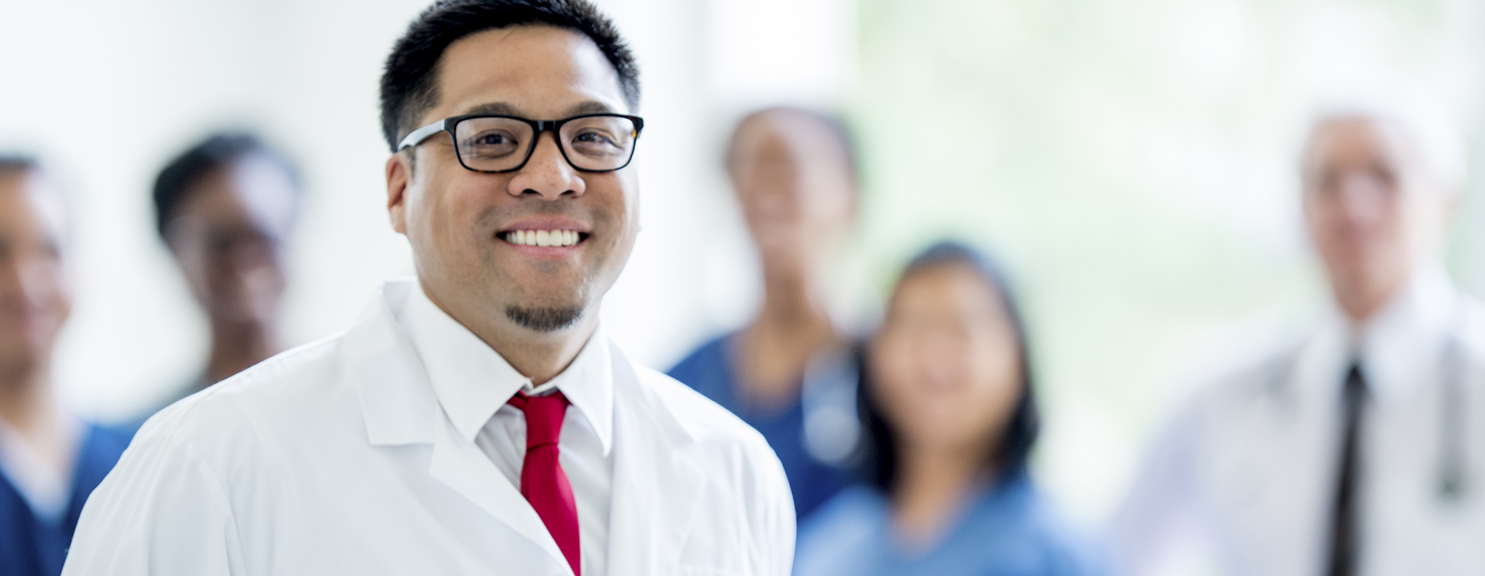What Do Physicians Do?
Physicians diagnose and treat diseases, illnesses, injuries, and physical and psychological problems. They examine and treat patients; obtain medical histories; and order, perform, and interpret diagnostic tests. They may also counsel patients on diet, hygiene, and preventive health care.
There are two types of physicians, the Medical Doctor (MD), or allopathic physician, and the Doctor of Osteopathy (DO). Both types of physicians may use all accepted treatment methods including drugs and surgery, but DOs generally place special emphasis on the body’s musculoskeletal system, incorporate more preventive medicine, and utilize holistic health care practices. DOs are most likely to be primary care specialists although they can be found in all specialties.
Physicians may work in one or more specialties that generally fit into four general categories: primary care, surgical, medical, and other. The category of “other” includes specialties such as radiology, dermatology, forensic pathology, obstetrics and gynecology, psychiatry, public health, anesthesiology, and many more.
For more information about physicians, go to: http://www.bls.gov/ooh/healthcare/physicians-and-surgeons.htm.
For more information on specialties, go to the Council of Medical Specialty Societies website. Click here.
Where Do Physicians Work?
Many physicians work in private offices or clinics. Increasingly, physicians are practicing in groups or health care organizations that provide backup coverage and allow for more time off. Surgeons and anesthesiologists usually work in hospitals or surgical outpatient centers.
Some physicians work in research laboratories, medical schools, Veterans Administration hospitals, or Indian Health Service clinics.
Although their work can be exceptionally rewarding, many physicians and surgeons work long, irregular hours. While on call, a physician will deal with many patients’ concerns over the phone and make emergency visits to hospitals or nursing homes.
How Much Do Physicians Earn?
Earnings of physicians and surgeons are among the highest of any occupation. Total compensation for physicians and surgeons tends to vary by type of practice, years in practice, geographic region of practice, hours worked, skill, and professional reputation.
In 2022, the average annual income reported by the Bureau of Labor Statistics (BLS) for general internal medicine physicians in the United States was $225,270. The New York State Department of Labor (NYSDOL) reports that, in 2023, general internal medicine physicians in New York earned a median annual salary of $174,151 (general internal medicine physicians in the 25th percentile made approximately $77,317 while those in the 75th percentile made approximately $265,258).
Self-employed physicians—those who own or are part owners of their medical practice—generally have higher median incomes than salaried physicians. However, self-employed physicians and surgeons must provide for their own practice insurance, health insurance, and retirement.
Supply and Demand
The Bureau of Labor Statistics projects that the number of jobs for physicians and surgeons in the U.S. will increase by 3% between 2021 and 2031. The New York State Department of Labor projects that the number of jobs for general internal medicine physicians in the state will increase by 6% between 2020 and 2030.
It is expected that there will continue to be a growing need for physicians influenced by the aging of the population, emerging technologies, and overall increased access to and demand for health care services. Many medical schools are increasing their enrollments based on perceived new demand for physicians.
The need for physicians differs by location, with greater need in rural and inner-city areas, and by specialty. For example, there is a larger need for more primary care physicians than many specialties.
For more information on physician and surgeon supply and demand, see the BLS job outlook page for this profession.
For more information on projections of physicians by New York State labor regions, (2018-2028), click here.
Educational Requirements
Becoming a physician requires completing medical school. Entry into medical school usually requires a bachelor’s degree or some other advanced degree. As a bachelor’s degree is typical of students before entering medical school, those students planning to attend medical school are often called “pre-med”. A pre-med undergraduate education focuses heavily on science, with courses in physics, biology, mathematics, English, and inorganic and organic chemistry. Many pre-med students also take courses in the humanities and the social sciences.
Formal education and training requirements for physicians are among the most demanding of any occupation. After completing four years of undergraduate education and receiving a degree, medical school applicants must take the Medical College Admission Test (MCAT). Acceptance to medical school is highly competitive. Once in medical school, students will complete four years of graduate medical education, which includes classroom, laboratory, and supervised clinical training; followed by three to eight years of internship and residency, depending on the specialty selected. A few medical schools offer combined undergraduate and medical school programs that last six or seven years rather than the customary eight years.
New York Licensure Requirements
To practice medicine as a physician, all states, the District of Columbia, and all U.S. territories require licensing. All physicians and surgeons practicing in the U.S. must pass the U.S. Medical Licensing Examination (USMLE). To be eligible to take the USMLE in its entirety, physicians must graduate from an accredited medical school.
To be licensed as a physician in New York, an individual must graduate from an accredited medical school, complete an accredited residency program, and pass medical licensing examinations. For more information on New York licensure requirements, go to http://www.op.nysed.gov/prof/med/medlic.htm.
Board Certification
While board certification is not required for licensure in New York, most physicians are board certified by the board of their specialty. Board certification usually includes written and oral tests that evaluate both the knowledge and experience of the physician. For more information about board certification or links to specific specialty boards, go to the American Board of Medical Specialties website: http://www.abms.org.
Financial Support
Most medical schools offer need-based and merit-based scholarships, based on the availability of the school’s funds. The medical school’s financial aid office is the primary point of contact for all financial aid matters and is a valuable resource for detailed information about grant and loan programs in New York and from the federal government. Once admitted to a medical school, explore the options at the school’s financial aid office and be sure to discuss the many good alternatives to borrowing and loans. Financial aid and other options may also be available for the pre-med period.
The federal government provides National Health Service Corps scholarships and loan repayment to physicians in exchange for a service commitment in a health professional shortage area (HPSA). It also offers loans for disadvantaged students and health professions student loans based on need. For more information, go to: https://bhw.hrsa.gov/loans-scholarships
New York State offers a physician loan forgiveness award program. The purpose of the Regents Physician Loan Forgiveness Award Program is to increase the number of physicians practicing in areas of New York State designated by the New York State Board of Regents as having a shortage of physicians. Emphasis is placed on primary care. For more information, click here
Pending the appropriation of State funds during the yearly session of the New York State legislature, at least 80 awards up to $10,000 per year for two years are offered. Award amount is based on undergraduate and medical school student loan amounts, loan interest expense, and income.
The American Medical Association also offers grants, awards, and scholarships to medical students. For more information, go to the AMA Web site page.
A variety of other scholarships, fellowships, and funding opportunities for medical school and other health professions are listed here.
Undergraduate Medical Education Programs in New York (subject to change)
| Albany Medical College 43 New Scotland Avenue Albany, NY 12208 (518) 262-3125 |
Albert Einstein College of Medicine 1300 Morris Park Avenue Bronx, NY 10461 (718) 430-2591 |
| Columbia University Vagelos College of Physicians & Surgeons 630 West 168th Street New York, NY 10032 (212) 305-2862 |
Weill Cornell Medicine 1300 York Avenue New York, NY 10065 (212) 746-5454 |
| Icahn School of Medicine at Mount Sinai One Gustave L. Levy Place New York, NY 10029-6574 (212) 241-6500 |
New York Institute of Technology College of Osteopathic Medicine Northern Boulevard Old Westbury, NY 11568 (516) 686-3997 |
| New York Medical College 40 Sunshine Cottage Road Valhalla, New York 10595 (914) 594-4000 |
New York University Long Island School of Medicine NYU Winthrop Hospital Campus 222 Station Plz Mineola, NY 11501 (516) 240-7240 |
| New York University School of Medicine -Langone Health 550 First Ave New York, NY 10016 (212) 263-5290 |
Hofstra University Zucker School of Medicine 500 Hofstra University Hempstead, NY 11549 (516) 463-7516 |
| SUNY Downstate Health Sciences UniversityCollege of Medicine 450 Clarkson Avenue Brooklyn, NY 11203 (718) 270-3776 |
SUNY Upstate Medical University 750 East Adams Street Syracuse, NY 13210 (315) 464-5540 |
| Stony Brook University Renaissance School of Medicine 101 Nicolls Road Health Sciences Center, Level 4 Stony Brook, NY 11794 (631) 689-8333 |
University at Buffalo-SUNY School of Medicine and Biomedical Sciences 955 Main Street Buffalo, NY 14203 (716) 829-3466 |
| University of Rochester School of Medicine and Dentistry 601 Elmwood Avenue Rochester, NY 14642 (585) 275-4539 |
Touro College of Osteopathic Medicine Harlem Campus 230 West 125th St. New York, NY 10027 (212) 851-1199Middletown Campus 60 Prospect Ave Middletown, NY 10940 (845) 648-1000 |
| The City College of New York CUNY School of Medicine 160 Convent Ave New York, NY 10031 (212) 650-7000 |
Additional Web Links
For more information about a career as a physician go to:
American Medical Association: http://www.ama-assn.org
American Osteopathic Association: www.osteopathic.org/
Medical Society of the State of New York: http://www.mssny.org
Association of American Medical Colleges: http://www.aamc.org
American Association of Colleges of Osteopathic Medicine: http://www.aacom.org
[whohit]Physicians[/whohit]

